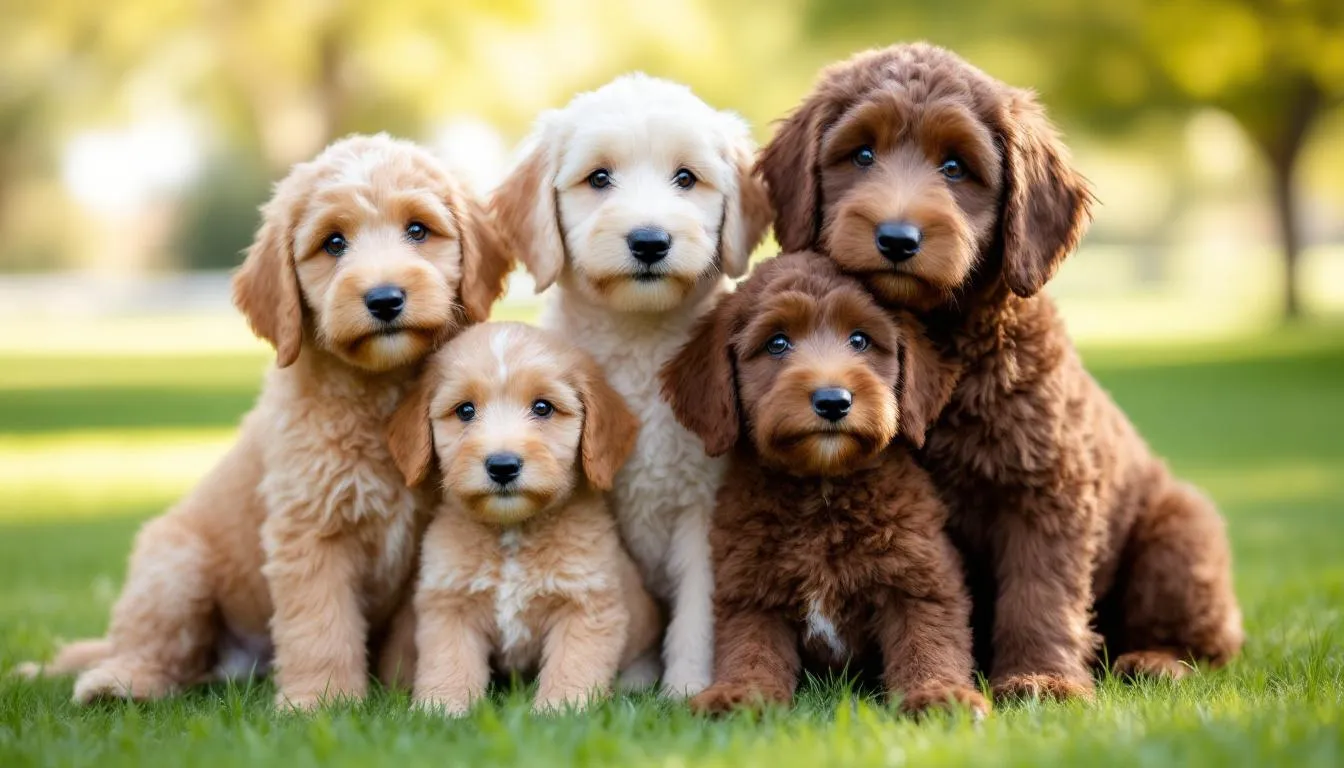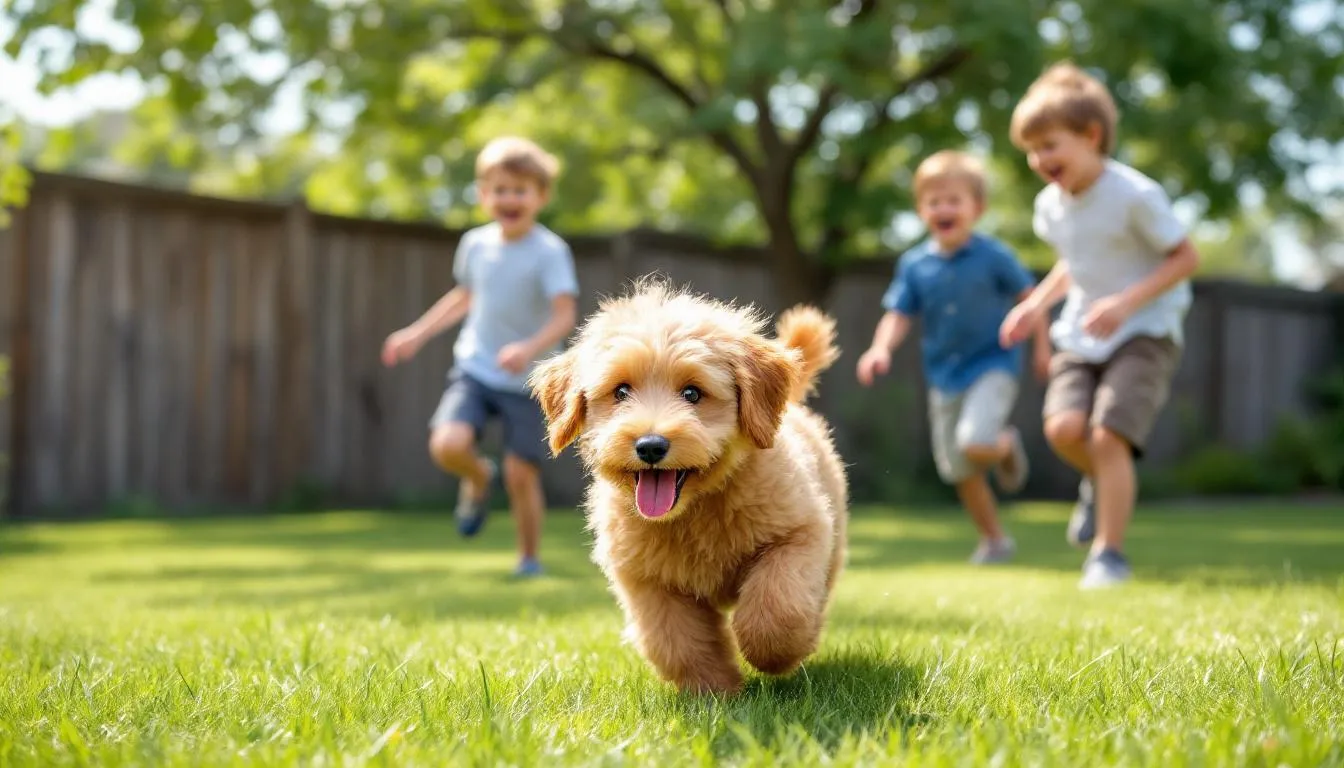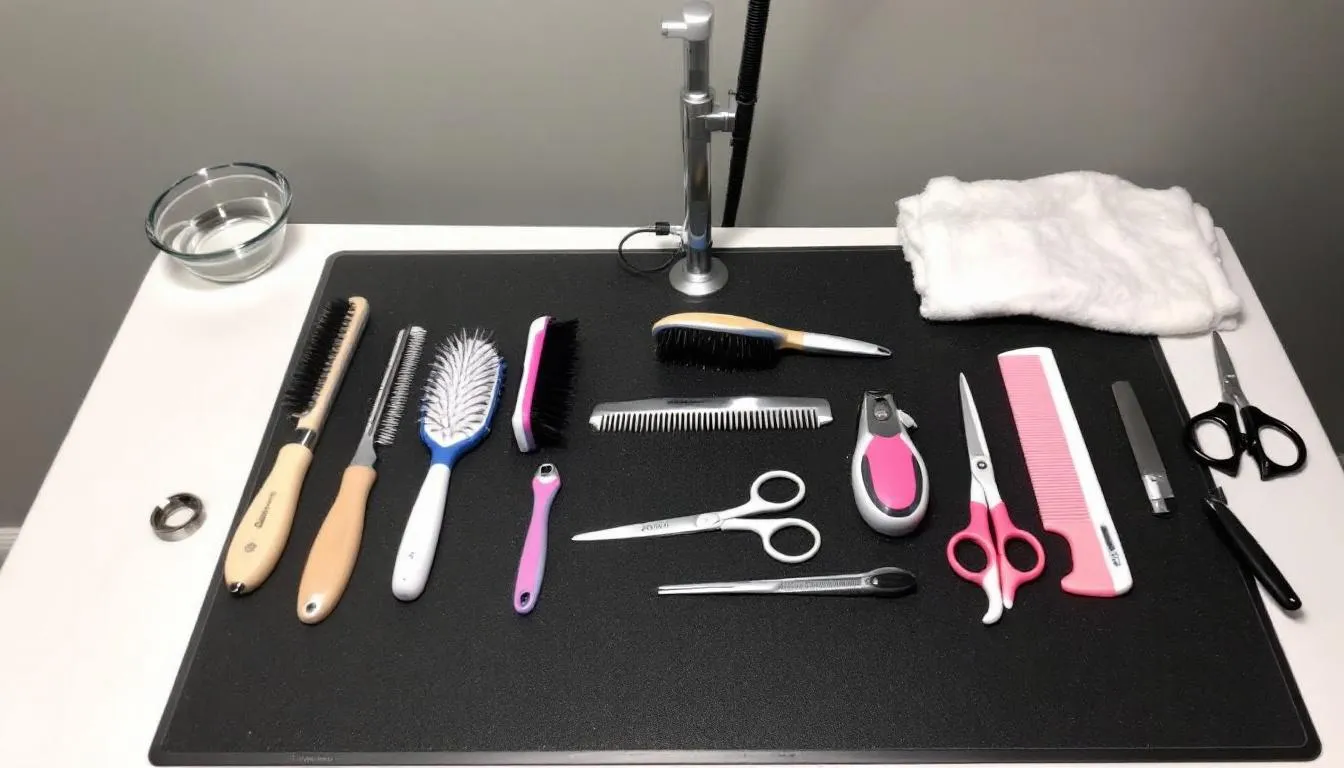

Key Takeaways
F1B Miniature Goldendoodles are 75% Poodle and 25% Golden Retriever, created by backcrossing an F1 with a purebred Miniature Poodle
- F1B Miniature Goldendoodles are 75% Poodle and 25% Golden Retriever, created by backcrossing an F1 with a purebred Miniature Poodle
- They typically weigh 15-35 pounds and stand 13-20 inches tall, making them perfect for apartment living and family homes
- Their curly, low-shedding coats are highly hypoallergenic, ideal for families with allergies
- F1B Mini Goldendoodles are highly intelligent, trainable, and have gentle temperaments perfect for first-time dog owners
- They require regular grooming every 6-8 weeks and daily brushing to maintain their coat health
They typically weigh 15-35 pounds and stand 13-20 inches tall, making them perfect for apartment living and family homes
Their curly, low-shedding coats are highly hypoallergenic, ideal for families with allergies
F1B Mini Goldendoodles are highly intelligent, trainable, and have gentle temperaments perfect for first-time dog owners
They require regular grooming every 6-8 weeks and daily brushing to maintain their coat health
The F1B Miniature Goldendoodle has become one of the most sought-after designer breeds in America, and for good reason. These adorable pups combine the best traits of both Golden Retrievers and Miniature Poodles while offering enhanced hypoallergenic properties that make them ideal lifelong companions for families dealing with allergies. Whether you’re a first-time dog owner or an experienced pet parent, understanding what makes the F1B Mini Goldendoodle special will help you decide if this sweet, intelligent breed fits your lifestyle.
What is an F1B Miniature Goldendoodle?
An F1B Miniature Goldendoodle represents a carefully planned second-generation mix between an F1 Mini Goldendoodle and a purebred Miniature Poodle, combining the genetics of both the Miniature Poodle and Golden Retriever. The “F1B” designation breaks down simply: “F1” indicates first-generation offspring, while “B” stands for backcross, meaning the F1 generation was bred back to one of the original parent breeds. The F1B Miniature Goldendoodle is a cross between an F1 Mini Goldendoodle and a purebred Miniature Poodle; this cross increases the percentage of Poodle genetics, which typically results in a curlier, more hypoallergenic coat and less shedding compared to other generations.
This strategic breeding creates a genetic composition of approximately 75% Miniature Poodle and 25% Golden Retriever. The F1B Miniature Goldendoodle is a popular doodle breed, known for its hybrid nature and desirable traits. As a type of mini doodle, the F1B generation differs from other mini doodle generations in terms of coat type, shedding, and temperament, depending on the specific mix of parent breeds. The purpose behind this backcrossing lies in enhancing the most desirable traits from the poodle parent - namely, the curly coat that produces minimal shedding and reduced allergic reactions in sensitive individuals. When considering a puppy, be sure to pay close attention to the details of generation labels and breeding information to make an informed decision.
Generational Comparison Mini Goldendoodle and Miniature Poodle
Understanding how F1B Mini Goldendoodles compare to other generations helps clarify their unique position:
|
Generation |
Genetic Makeup |
Coat Predictability |
Hypoallergenic Rating |
|---|---|---|---|
|
F1 |
50% Poodle, 50% Golden Retriever |
Moderate |
Good |
|
F1B |
75% Poodle, 25% Golden Retriever |
High |
Excellent |
|
F1BB |
87.5% Poodle, 12.5% Golden Retriever |
Very High |
Outstanding |
|
F2 |
50% Poodle, 50% Golden Retriever (F1 x F1) |
Low |
Variable |
Generation
Genetic Makeup
Coat Predictability
Hypoallergenic Rating
F1
50% Poodle, 50% Golden Retriever
Moderate
Good
F1B
75% Poodle, 25% Golden Retriever
High
Excellent
F1BB
87.5% Poodle, 12.5% Golden Retriever
Very High
Outstanding
F2
50% Poodle, 50% Golden Retriever (F1 x F1)
Low
Variable
The F1B generation strikes an optimal balance between genetic diversity and predictable traits, making them a top priority for families seeking hypoallergenic coats without sacrificing the gentle temperament that makes mini goldendoodles such wonderful family pets. F1B Miniature Goldendoodles are less likely to shed compared to other generations, thanks to their higher percentage of Poodle genetics. While most F1B coats are wavy or curly, some mini doodles may have a straight coat, which can influence how much they shed and their grooming requirements.


F1B Mini Goldendoodle Size and Physical Characteristics
When fully grown, F1B Mini Goldendoodles typically weigh between 15-35 pounds and stand 13-20 inches at the shoulder. This compact size makes them incredibly versatile, equally comfortable in apartments or larger homes with yards. Most dogs reach their adult size between 12-18 months, with males generally growing slightly larger than females.
Their athletic build reflects the best of both parent breeds - the sturdy frame of a Golden Retriever scaled down through Mini Poodle genetics. This size range places them perfectly between toy breeds that might be too delicate for active families and larger dogs that require more space and exercise.
Growth Timeline
F1B Mini Goldendoodle puppies experience rapid growth in their first six months:
- 8-12 weeks : 3-8 pounds
- 3-4 months : 8-15 pounds
- 6 months : 12-25 pounds
- 12-18 months : Adult weight achieved (15-35 pounds)
8-12 weeks : 3-8 pounds
3-4 months : 8-15 pounds
6 months : 12-25 pounds
12-18 months : Adult weight achieved (15-35 pounds)
The high percentage of Mini Poodle genetics tends to produce more predictable sizing compared to other generations, though individual variation still occurs based on the specific parents used in breeding.
Coat Type and Hypoallergenic Properties
The curly coat inherited from the higher Poodle genetics percentage makes F1B Mini Goldendoodles particularly appealing to families with allergies. Unlike F1 generations where coat type can vary significantly, F1B pups consistently develop wavy to curly coats that trap dander and reduce the amount of allergens released into the environment. F1B Miniature Goldendoodles are often recommended for families with severe allergies due to their highly hypoallergenic coats.
This coat type produces little fur compared to traditional shedding breeds. The tight curl pattern means loose hair gets caught within the coat rather than falling onto furniture and floors, making them excellent choices for people with mild to moderate allergies. However, it’s important to understand that no dog is completely hypoallergenic - individual reactions vary based on specific sensitivities to dander, saliva, or other proteins.
Seasonal Considerations
F1B Mini Goldendoodles experience minimal seasonal coat changes compared to double-coated breeds. Their single-layer, poodle-type coat tends to grow continuously rather than shedding heavily during spring and fall transitions. This consistency makes them predictable housemates year-round, though their grooming needs remain constant regardless of season.
The quality of their hypoallergenic coats depends largely on proper grooming and maintenance. Neglected coats can trap more allergens and become less effective at containing dander, making regular care essential for maintaining their low-shedding properties.


Temperament and Personality Traits
F1B Mini Goldendoodles inherit an exceptional blend of traits that make them outstanding family companions. Their high intelligence comes primarily from their Poodle lineage, while their gentle, affectionate nature reflects the Golden Retriever influence. This combination creates dogs that are both smart enough to train easily and sweet enough to be wonderful with children and other pets. F1B Mini Goldendoodles are known for their deep affection for their families and their desire for close physical and emotional bonds.
These dogs tend to be highly social and form strong bonds with their families. They often exhibit emotional intelligence that allows them to respond appropriately to human moods, making them excellent candidates for therapy or emotional support work. F1B Miniature Goldendoodles are valued as lifelong companions due to their emotional intelligence and compatibility with a wide range of family lifestyles. Their playful nature keeps them entertaining throughout puppyhood while their moderate energy level makes them manageable as adults.
Energy and Exercise Needs
F1B Mini Goldendoodles require moderate exercise - typically 30-60 minutes daily split between walks, playtime, and mental stimulation. Their intelligence means they need both physical activity and brain work to stay content. A bored F1B mini can become destructive, but providing appropriate outlets for their energy keeps them happy and well-behaved.
Their adaptable personality makes them suitable for various living situations. Whether you live in an apartment and provide daily walks or have a large yard for free play, these dogs adjust to their environment while maintaining their cheerful disposition.
Training and Intelligence
The high percentage of Poodle genetics gives F1B Mini Goldendoodles exceptional trainability. Poodles rank among the most intelligent dog breeds, and this trait carries strongly into F1B crosses. Most dogs can master basic obedience commands within 8-16 weeks with consistent, positive training methods.
Breeders and owners are often talking about the F1B Miniature Goldendoodle's intelligence and hypoallergenic qualities when recommending them to new families. Their eagerness to please makes them excellent candidates for first time dog owners who might feel overwhelmed by more stubborn breeds. F1B Mini Goldendoodles respond best to positive reinforcement techniques using treats, praise, and play as rewards. Harsh correction methods are unnecessary and counterproductive with these sensitive, intelligent dogs.
Training Timeline and Milestones
- 8-12 weeks : Basic house training, name recognition, simple commands
- 3-4 months : Leash walking, “sit,” “stay,” basic manners
- 4-6 months : Advanced commands, recall training, socialization
- 6+ months : Specialized training (agility, therapy work, advanced tricks)
8-12 weeks : Basic house training, name recognition, simple commands
3-4 months : Leash walking, “sit,” “stay,” basic manners
4-6 months : Advanced commands, recall training, socialization
6+ months : Specialized training (agility, therapy work, advanced tricks)
Mental stimulation proves just as important as physical exercise for these highly intelligent dogs. Puzzle toys, training games, and varied activities prevent boredom and strengthen the bond between dog and owner. Many F1B Mini Goldendoodles excel in dog sports, therapy work, and even service training due to their combination of intelligence and gentle temperament.


Grooming Requirements and Maintenance
The curly coat that makes F1B Mini Goldendoodles so appealing also creates significant grooming needs. Daily brushing prevents mats from forming, while professional grooming every 6-8 weeks keeps their coat healthy and manageable. This commitment represents one of the most important considerations for potential owners.
Essential Grooming Tools
- Slicker brush : For daily brushing and mat prevention
- Metal comb : To check for tangles in dense areas
- Detangling spray : Helps work through minor mats
- High-quality scissors : For touch-ups between professional visits
- Nail clippers : Monthly nail maintenance
Slicker brush : For daily brushing and mat prevention
Metal comb : To check for tangles in dense areas
Detangling spray : Helps work through minor mats
High-quality scissors : For touch-ups between professional visits
Nail clippers : Monthly nail maintenance
Professional grooming costs typically range from $75-150 per visit, depending on location and specific services. Annual grooming expenses often total $600-1,200, making this a significant ongoing cost to factor into ownership decisions.
Grooming Schedule
|
Task |
Frequency |
Why It Matters |
|---|---|---|
|
Brushing |
Daily (minimum 3x/week) |
Prevents mats, distributes oils |
|
Professional grooming |
Every 6-8 weeks |
Maintains coat health, nail care |
|
Ear cleaning |
Weekly |
Prevents infections in floppy ears |
|
Bathing |
Monthly or as needed |
Removes allergens, maintains cleanliness |
|
Nail trimming |
Every 2-3 weeks |
Comfort and proper walking |
Task
Frequency
Why It Matters
Brushing
Daily (minimum 3x/week)
Prevents mats, distributes oils
Professional grooming
Every 6-8 weeks
Maintains coat health, nail care
Ear cleaning
Weekly
Prevents infections in floppy ears
Bathing
Monthly or as needed
Removes allergens, maintains cleanliness
Nail trimming
Every 2-3 weeks
Comfort and proper walking
Neglecting grooming needs can lead to painful mats, skin irritation, and increased shedding that reduces their hypoallergenic benefits. However, dogs that receive consistent care develop beautiful, healthy coats that truly enhance their appeal as family pets.
Health and Lifespan
F1B Mini Goldendoodles typically enjoy robust health with lifespans ranging from 12-16 years. Their crossbred nature provides some protection against breed-specific health issues through hybrid vigor, though they can still inherit certain conditions from both parent breeds.
Common Health Considerations
- Hip dysplasia : Joint condition affecting mobility
- Progressive retinal atrophy : Eye condition that can lead to blindness
- Ear infections : Due to floppy ears and dense coat around ear canals
- Bloat : Potentially serious digestive condition
- Allergies : Both food and environmental sensitivities
Hip dysplasia : Joint condition affecting mobility
Progressive retinal atrophy : Eye condition that can lead to blindness
Ear infections : Due to floppy ears and dense coat around ear canals
Bloat : Potentially serious digestive condition
Allergies : Both food and environmental sensitivities
Responsible breeders conduct health testing on parent dogs to minimize the risk of genetic conditions. When choosing a breeder, ask for documentation of health clearances including hip scoring, eye examinations, and genetic testing for common Poodle and Golden Retriever conditions.
Preventive Care Schedule
Regular veterinary care helps catch potential issues early:
- Puppy vaccines : 8, 12, and 16 weeks
- Annual wellness exams : Throughout adult life
- Senior checkups : Twice yearly after age 8
- Dental cleanings : As recommended by veterinarian
- Parasite prevention : Year-round flea, tick, and heartworm protection
Puppy vaccines : 8, 12, and 16 weeks
Annual wellness exams : Throughout adult life
Senior checkups : Twice yearly after age 8
Dental cleanings : As recommended by veterinarian
Parasite prevention : Year-round flea, tick, and heartworm protection
Maintaining a healthy weight through proper diet and exercise significantly impacts longevity and quality of life. F1B Mini Goldendoodles should maintain a lean body condition with easily felt ribs and a visible waist tuck when viewed from the side.
Cost and Investment Considerations
Purchasing an F1B Mini Goldendoodle from a reputable breeder typically costs between $1,500-4,000, with price variations based on breeder reputation, health testing, location, and waiting list demand. The search for an F1B Miniature Goldendoodle often involves researching breeders and considering adoption options to find the ideal puppy. However, the initial purchase price represents just the beginning of financial commitment to these dogs.
When adopting a Goldendoodle, whether from a breeder or a rescue organization, it's important to consider factors such as health guarantees, background information, and support throughout the process.
Annual Ownership Costs
|
Expense Category |
Annual Cost Range |
|---|---|
|
Food (high-quality) |
$300-600 |
|
Professional grooming |
$600-1,200 |
|
Veterinary care |
$500-1,500 |
|
Supplies/replacements |
$200-400 |
|
Pet insurance (optional) |
$400-800 |
Total Annual Cost |
$2,000-4,500 |
Expense Category
Annual Cost Range
Food (high-quality)
$300-600
Professional grooming
$600-1,200
Veterinary care
$500-1,500
Supplies/replacements
$200-400
Pet insurance (optional)
$400-800
Total Annual Cost
$2,000-4,500
Over a 14-year lifespan, total ownership costs often exceed $28,000-63,000, making F1B Mini Goldendoodles a significant long-term investment. Emergency medical care, boarding during vacations, and training classes can add thousands more to these estimates.
Factors Affecting Purchase Price
Quality breeders who invest in health testing, proper socialization, and excellent care command higher prices. While puppy mill operations might offer lower initial costs, the risk of health problems and behavioral issues makes them poor financial choices long-term.
Pet insurance can help manage unexpected veterinary expenses, with monthly premiums typically ranging from $30-70 depending on coverage level and deductible choices.


Choosing the Right F1B Mini Goldendoodle
F1B Mini Goldendoodles work best for specific types of households and lifestyles. Understanding whether this breed fits your situation prevents disappointment and ensures both dog and family thrive together. By considering your needs and lifestyle, you can determine if the F1B Miniature Goldendoodle is the best choice for your family.
Ideal Candidates
- Families with children : Their gentle nature and appropriate size make them excellent with kids
- First time dog owners : High trainability and moderate exercise needs
- People with mild allergies : Low shedding coat reduces allergen exposure
- Apartment dwellers : Compact size works well in smaller spaces
- Active individuals : Enjoy daily walks and interactive play
Families with children : Their gentle nature and appropriate size make them excellent with kids
First time dog owners : High trainability and moderate exercise needs
People with mild allergies : Low shedding coat reduces allergen exposure
Apartment dwellers : Compact size works well in smaller spaces
Active individuals : Enjoy daily walks and interactive play
Lifestyle Requirements
Success with an F1B Mini Goldendoodle requires commitment to:
- Daily exercise : 30-60 minutes of activity and mental stimulation
- Regular grooming : Professional care every 6-8 weeks plus daily brushing
- Consistent companionship : These social dogs don’t do well left alone for extended periods
- Training investment : Early socialization and obedience training for best results
Daily exercise : 30-60 minutes of activity and mental stimulation
Regular grooming : Professional care every 6-8 weeks plus daily brushing
Consistent companionship : These social dogs don’t do well left alone for extended periods
Training investment : Early socialization and obedience training for best results
Red Flags When Choosing a Breeder
Avoid breeders who:
- Cannot provide health testing documentation for parent dogs
- Have multiple litters available constantly
- Won’t allow visits to see the breeding facility
- Cannot provide references from previous puppy buyers
- Seem more focused on profit than puppy welfare
- Advertise on classified ad websites without screening buyers
Cannot provide health testing documentation for parent dogs
Have multiple litters available constantly
Won’t allow visits to see the breeding facility
Cannot provide references from previous puppy buyers
Seem more focused on profit than puppy welfare
Advertise on classified ad websites without screening buyers
Quality breeders often have waiting lists and extensive application processes. They want to ensure their puppies go to appropriate homes and will ask detailed questions about your lifestyle, experience, and expectations.
FAQ
How long do F1B Mini Goldendoodles live?
Average lifespan is 12-16 years, with smaller sizes generally living longer than larger Goldendoodle variants due to reduced strain on joints and organs. Proper diet, exercise, and veterinary care significantly impact longevity.
Do F1B Mini Goldendoodles bark a lot?
They are moderate barkers who typically only vocalize when alerting to visitors or during play, making them suitable for apartment living with proper training. Their intelligent nature makes them easy to train regarding appropriate barking behavior.
Can F1B Mini Goldendoodles be left alone during work hours?
While they prefer companionship, they can handle 6-8 hours alone with proper exercise before and after, plus mental stimulation toys to prevent anxiety. Crate training helps them feel secure during alone time.
What’s the difference between F1B and F1BB Mini Goldendoodles?
F1BB contains 87.5% Poodle genetics versus 75% in F1B, resulting in even curlier coats and smaller sizes (10-25 pounds), but F1B offers better genetic diversity and more predictable temperament traits.
Are F1B Mini Goldendoodles good with cats?
Yes, their gentle Golden Retriever temperament combined with Poodle intelligence makes them excellent with cats, especially when socialized early during puppyhood. Their moderate energy level and trainable nature help them learn appropriate behavior around other pets.
Do breeders provide videos of puppies before adoption?
Many breeders offer videos of available puppies to help families make informed decisions. These videos allow you to observe the puppies' personalities, behavior, and interactions, making it easier to choose the right companion for your home.
FAQ
How long do F1B Mini Goldendoodles live?
Average lifespan is 12-16 years, with smaller sizes generally living longer than larger Goldendoodle variants due to reduced strain on joints and organs. Proper diet, exercise, and veterinary care significantly impact longevity.
Do F1B Mini Goldendoodles bark a lot?
They are moderate barkers who typically only vocalize when alerting to visitors or during play, making them suitable for apartment living with proper training. Their intelligent nature makes them easy to train regarding appropriate barking behavior.
Can F1B Mini Goldendoodles be left alone during work hours?
While they prefer companionship, they can handle 6-8 hours alone with proper exercise before and after, plus mental stimulation toys to prevent anxiety. Crate training helps them feel secure during alone time.
What’s the difference between F1B and F1BB Mini Goldendoodles?
F1BB contains 87.5% Poodle genetics versus 75% in F1B, resulting in even curlier coats and smaller sizes (10-25 pounds), but F1B offers better genetic diversity and more predictable temperament traits.
Are F1B Mini Goldendoodles good with cats?
Yes, their gentle Golden Retriever temperament combined with Poodle intelligence makes them excellent with cats, especially when socialized early during puppyhood. Their moderate energy level and trainable nature help them learn appropriate behavior around other pets.
Do breeders provide videos of puppies before adoption?
Many breeders offer videos of available puppies to help families make informed decisions. These videos allow you to observe the puppies' personalities, behavior, and interactions, making it easier to choose the right companion for your home.






